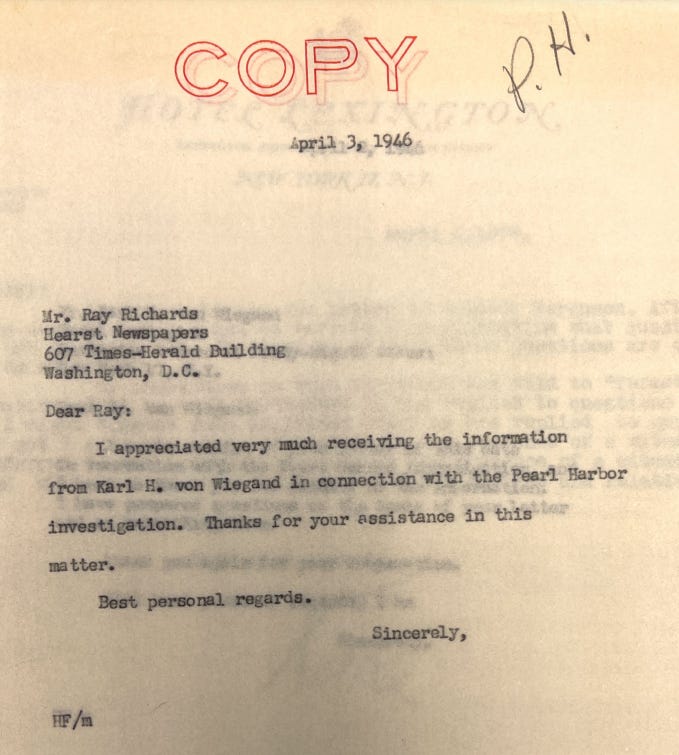Pearl Harbor: Reporter Tells US Japs Will Attack After Midnight on Dec. 6th
Hearst Senior Foreign Correspondent's Tips Were Good Enough for Admirals to Flee China, but not Good Enough to Warn Hawaii
So the letter I’m about to show to you, below, is from Karl Henry von Wiegand to Sen. Homer Ferguson.
Wiegand was the senior foreign correspondent for the Hearst newspaper chain. He was a very prominent journalist of the era, though he’s been a bit forgotten ever since.
What Wiegand reveals is that he warned the United States that December 6th was the Japanese ‘deadline’ for resolving their dispute with the US short of war, and that at any time after midnight on December 6th, war might start.
Here is Wiegand and his 21 year younger travel buddy, Lady Drummond-Hay.
Reporter Wiegand relayed his information to Admiral Glassford, below.
Here are the critical excerpts of what Reporter Wiegand says he relayed to Adm. Glassford:
The Wiegand letter also shows that Adm. Glassford took his tips seriously enough to flee China prior to the date of Japanese attack and encourage Wiegand and Drummond-Hay to flee with him, such that they were all comfortably dining in the Philippines when the Pearl Harbor attack started.
The information came from a Japanese official who was later prosecuted as a war criminal and whose Secretary ended up in an internment camp. Also from Wiegand’s letter:
I’m giving you the entire chain of Wiegand letters sent to Sen. Ferguson, below. It’s notable that the letter claims the Germans also had foreknowledge that the attack was happening and when.
Wiegand also references taking this vital information, that Japan was about to attack and by when, and reporting that information in a story around October 30, 1941 or so, over a month before the Japanese attack on Pearl Harbor. I found his story on November 2nd, in the San Francisco Examiner, reproduced below for your review. It certainly gives credibility to Wiegand’s letter.
In my previous post, Toward a Taxonomy of Advance Warning about Pearl Harbor Claims, I made the point that there are a wide variety of allegations by different authors, and that discussing the matter requires precision on this point.
So, the Wiegand letter, if believed and accepted as true, should be considered as challenging the narrative that Washington/Roosevelt could have stopped the war and didn’t, and also that Washington/Roosevelt knew that Japan would attack first.
November 2, 1941 in the San Francisco Examiner, pages 1, 14: “Deadline on War Decision Set by Tokio”
Politica | PEARL HARBOR SERIES:
Pt 7 - Toward a Taxonomy of Claims about “Advance Knowledge” of the Attack
Pt 6 - Japs Were Trying to Escape Panama on Dec. 2nd
Pt 5 - Yes, there was Warning of the Pearl Harbor Attack
Pt 4 - ‘Very Bitter’ Housewife in ‘45 Notes Flaws in the Official Story
Pt 3 - Lloyd’s of London Cancelled Insurance Policies in August 1941
Pt 2 - Tips About The Pearl Harbor Attack 77 Years Late
Pt 1 - Pearl Harbor Revisionism














